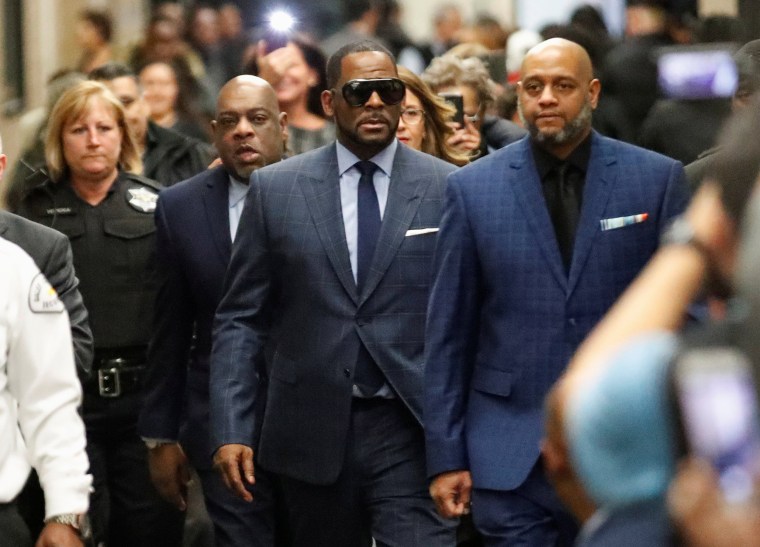CHICAGO — R. Kelly grew up in a public housing project in one of Chicago's toughest South Side neighborhoods and built a worldwide musical brand that earned tens of millions of dollars over a nearly 30-year career.
But tax and legal issues — including recently filed charges that he sexually abused three girls and a woman — could leave the Grammy winner who has written songs for some of music's top stars with next to nothing.
In an emotional interview that aired this week, Kelly told "CBS This Morning" that people stole money from his bank accounts. He offered no details.
His defense attorney said last month that the performer's finances were "a mess" after Kelly was unable to post $100,000 in bail after his arrest on 10 counts of aggravated sexual abuse. The allegations date back as far as 1998 and span more than a decade. The singer, who was acquitted of child pornography charges in 2008, has denied wrongdoing and pleaded not guilty.
The lack of cash forced Kelly to spend a weekend in a Chicago jail. On Wednesday, he was jailed again because he did not bring enough money to court to pay $161,000 in back child support.
For many entertainers, their income depends on recording, concert or other music-related deals, said Chicago attorney Eric Macey.
"In the recording business, it's not like you get a check every week," Macey said Thursday. He represented former Kelly business manager Derrel McDavid in a 2014 lawsuit against Kelly. A court entered a civil judgment of just over $1 million against the star.
"There were claims of a lack of dollars, but it was never corroborated," Macey said, adding that the lawsuit was resolved "to our satisfaction."
Kelly lamented to CBS that he was unable to access $350,000 because he had moved the money from one bank account to a new account, and the funds had not cleared in time to use it for his bail. A 47-year-old business owner from suburban Romeoville identified herself on the bond slip as "a friend" of Kelly's.
Peter Henning, a former federal prosecutor and current law professor at Wayne State University in Detroit, said money laundering rules might keep banks from shifting assets from one account to another.
Banks are required to report certain transactions, such as cash withdrawals over $10,000. Some transactions over $3,000 could trigger suspicious activity reports, Henning said.
That means a bank probably could not move the money into a new account without getting a raft of personal information from Kelly, including a description of the source of the funds.
"It's not easy to move that much money overnight," Henning said.
The files of Kelly's criminal case include a notation of his child-support debt.
After Wednesday's child support hearing, Kelly's publicist, Darryll Johnson, confirmed what has been widely reported in recent months: Kelly's concert dates are drying up.
"He hasn't worked in a long time. He can't book shows," Johnson said.
In fact, at least some of Kelly’s concerts have been canceled in recent months.
Kelly had defiantly scheduled shows in Germany and the Netherlands despite the cloud of legal issues looming over him. But a judge ordered him to surrender his passport.
Kelly's options for earning money dwindled after the release of a BBC documentary about him last year and the multipart Lifetime documentary "Surviving R. Kelly," which aired last month. Together they detailed allegations he was holding women against their will and running a "sex cult."
Kelly and his lawyers have consistently denied that he has engaged in illegal activity.
In an interview with CBS News’ Gayle King that aired Wednesday, Kelly said of the new charges in Chicago, "I didn’t do this stuff."
"This is not me. I’m fighting for my f---ing life," he said.
A social media campaign under the #MuteRKelly hashtag pushed fans to boycott his concerts and music. Spotify later cut Kelly's music from its playlists. News outlets also reported last year that Apple and Pandora were not promoting Kelly's music.
About four years later another woman, Tracy Sampson, sued Kelly alleging their sex was illegal under Illinois law because he was in "a position of authority" over her. Sampson told NBC News she met Kelly in 1999 when she was a 16-year-old intern at his record company.
"I was in love with him," she told NBC’s Dateline in January. "I just didn't know what to do. Like, I didn't know if this was normal. I didn't know if this is how adults acted." She said she settled the lawsuit for $250,000 in 2002. (here’s story I’m going to link to:
Kelly's attorney told NBC News in response to Sampson’s comments in January that he didn't represent the artist when Sampson alleges she was abused, but he was adamant that his client has done nothing wrong.
He also said there is no evidence of Kelly's having sex with underage girls "because it didn't happen."
Kelly broke into the R&B scene in 1993 with his first solo album, "12 Play." He has written numerous hits for himself and other artists, including Celine Dion, Michael Jackson and Lady Gaga. One of his best-known hits is "I Believe I Can Fly."
